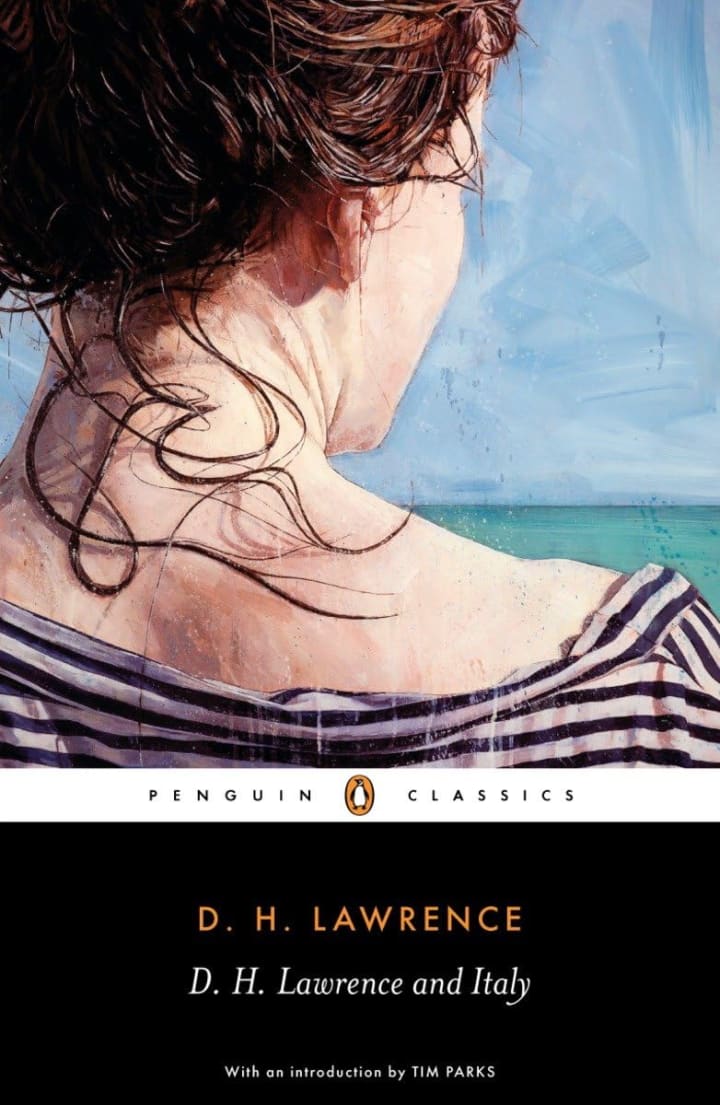Book Review: "DH Lawrence and Italy" ed. by Michael Squires
5/5 - DH Lawrence could never get anything less...

"The Italian landscape has the one quality that I find so admirable. It is complete in itself. It is utterly, satisfyingly whole."
Between the years of 1912 and 1919, DH Lawrence spent significant time in Italy, often drawn to the country's weather and its iconic landscapes (many of which are described in this text). He often found the climates to have a net positive impact on his health and wrote about the places as having some great importance over his writing as well. His relationship with his wife became even deeper as they travelled together and even though he attracted the criticism of the British societies and Italian societies because of this unorthodox approach to living, this didn't mean he necessarily changed his ways entirely.
Writing some of his most famous texts using certain qualities of Italian landscapes and life, DH Lawrence penned scenes from "Sons and Lovers" and "Women in Love". Upon the latter parts of his Italian travels, he would begin the writing on "Aaron's Rod" and "The Lost Girl". It would be some years before we entered the realms of his mind which held "Lady Chatterley's Lover". Whether his reputation was in turmoil or not, it did not dampen his will to write and so, what we have in this book is the very stuff that kept his writing alive - the Italian landscape, the love of it and his undying passion for descriptive writing.
One of the things I liked about this book is that there is a subchapter where DH Lawrence attends the Italian theatre and speaks about his experiences there. He describes the bustling theatre atmosphere with all different kinds of people, how they won't shave until Sunday and so the men aren't looking their best and how the scenery of the Italian theatre is something special, grand and at times, quite intense. He states that the actors are mainly peasants and so, I don't know whether he is thinking himself above them or simply making said observation. Whichever way, I think it is important to notice how little he expands on this in comparison to the atmosphere of the theatre itself.
Unfortunately, it doesn't seem like DH Lawrence actually liked the acting very much, though he had plenty to say of the atmosphere. Do I think this is because it is a peasant actor or not? I don't think it is as DH Lawrence himself was not actually a part of the elite and often wrote about the working people rather than the rich. However, it is worthy to note how he points out characteristics of people and how he comments on them in comparison for his vast appreciation of the landscape and its beauty.
Be that as it may, he has plenty of nicer opinions about the woman in the play whom he equally refers to as 'pathetic' and then as some quite special. I like how his opinion here jumps around because it reminds me of when took the Mickey out of Thomas Mann in his essays text Life with a Capital L and yet equally showed his appreciation for him.

The beginning of the section Italians in Exile is absolutely beautiful as he describes being on a boat and seeing the people around him, the waves and the beauty of the calm wandering atmosphere. It is one of the few joys of life to read a description written by DH Lawrence. Check this out:
"Still, the mist hung over the waters, over the wide shallows of the river, and the sun, coming through the morning, made lovely yellow lights beneath the bluish haze, so that it seemed like the beginning of the world."
I don't know about you but I love the descriptions of morning that DH Lawrence can make look absolutely divine, as if something gorgeous is being born out of the ether of the world. Upon the return journey, we get just as much beauty and nothing is lost. It feels still, like the reader is experiencing the same atmosphere for the first time.
The ferry journey from Palermo to Cagliari is detailed in his travelogue Sea and Sardinia and is so incredible as he offers up opinions and descriptions about his encounters with locals (both good and bad), the way he observes the beauty of the surroundings and yet, pays great attention to the complexities of rural life - noting how it is both organic and harsh. It is a rich and descriptive piece in which DH Lawrence shows off some of his best travel writing and honestly, it is probably one of my favourite works by him after his collection of essays published as Life with a Capital L.
Sketches of the Etruscan Places may have been published posthumously, but it is still included in this anthology as it plays a huge part in our understanding of his travels. It details his visits to several Etruscan sites, including Cerveteri, Tarquinia, Vulci, and Volterra and all of them have an individuality to them in which they are, like in Sea and Sardinia both beautiful and unique in their treatment of their local populations. But I think if you're reading this then you're probably enjoying the same thing I am: the details of the different tombs, cemeteries, necropolises, ruins and other ancient atmospheres which have that eternal scent of past and death which, as we know, DH Lawrence features incredibly in this work.

The landscape is not jus beautiful and picturesque but now it has an existential meaning with a historical significance. He turns the places into everlasting lands with an entire story of past, present and future carefully woven together. They exist now and they will continue to exist long after we have all perished. It is just incredible. And yet again, there is no definitive opinion as it sounds both incredibly expansive and grief-stricken at certain points in the writing. As if he is reflecting on himself and his own legacy at the same time.
All in all, most of this book explores something deep and philosophical in the writer and I'm not going to lie I was waiting for Penguin to publish something on DH Lawrence because it was required. We always need new anthologies in which we explore past authors and their relationships with places, people and things. It is a breathtaking text which brings together some very important parts of Lawrence's life, showcasing them to us as personal explorations of his own soul.
About the Creator
Annie Kapur
200K+ Reads on Vocal.
Secondary English Teacher & Lecturer
🎓Literature & Writing (B.A)
🎓Film & Writing (M.A)
🎓Secondary English Education (PgDipEd) (QTS)
📍Birmingham, UK
X: @AnnieWithBooks
Enjoyed the story? Support the Creator.
Subscribe for free to receive all their stories in your feed. You could also pledge your support or give them a one-off tip, letting them know you appreciate their work.






Comments
There are no comments for this story
Be the first to respond and start the conversation.